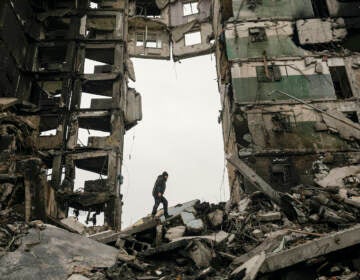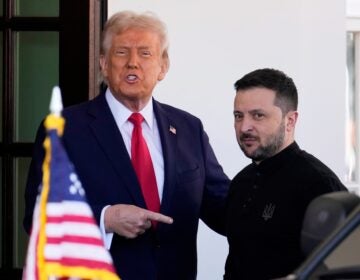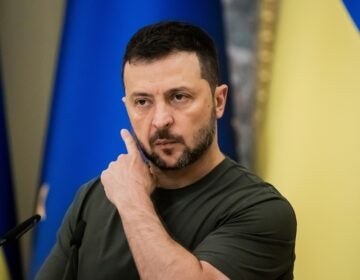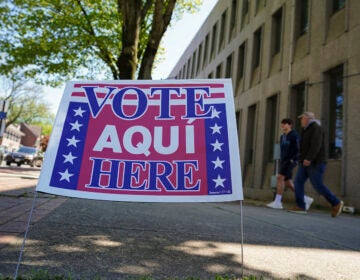U.N. assembly suspends Russia from top human rights body
Russia is the second country to have its membership rights stripped at the Human Rights Council which was established in 2006.

Sergiy Kyslytsya, Permanent Representative of Ukraine to the United Nations, speaks during a meeting of the United Nations General Assembly, Thursday, April 7, 2022, at United Nations headquarters. The U.N. General Assembly scheduled a vote Thursday on a resolution to suspend Russia from the world organization's leading human rights body over allegations that Russian soldiers killed civilians while retreating from the region around Ukraine's capital. (AP Photo/John Minchillo)
The U.N. General Assembly voted Thursday to suspend Russia from the world organization’s leading human rights body over allegations of horrific rights violations by Russian soldiers in Ukraine, which the United States and Ukraine have called tantamount to war crimes.
It was a rare, if not unprecedented rebuke against one of the five veto-wielding members of the U.N. Security Council.
The vote on the U.S. initiated resolution was 93-24 with 58 abstentions, significantly lower than the vote on two resolutions the assembly adopted last month demanding an immediate cease-fire in Ukraine, withdrawal of all Russian troops and protection for civilians. Both of those resolutions were approved by at least 140 nations.
Russia’s deputy ambassador Gennady Kuzmin announced after the vote that Russia withdrew from the Human Rights Council earlier Thursday, before the assembly took action, apparently in expectation of the result. He accused the council of being monopolized by a group of countries with “short-term political and economic interests” that he accused of “blatant and massive violations of human rights.”
The Geneva-based Human Rights Council is tasked with spotlighting and approving investigations of rights violations including in Syria and in late March in Ukraine. And it does periodic reviews of the human rights situation in all 193 U.N. member nations.
The 47-member council was created in 2006 to replace a commission discredited because of some members’ poor rights records. The new council soon faced similar criticism, including that rights abusers sought seats to protect themselves and their allies, and for focusing on Israel.
Along with Russia, other four permanent members of the U.N. Security Council — Britain, China, France, and the United States, which rejoined this year — currently have seats on the Human Rights Council. Other members with widely questioned rights records along with China include Eritrea, Venezuela, Sudan and Libya.
U.S. Secretary of State Antony Blinken said when the U.S. was elected to the council last year that it has an important role in “documenting atrocities in order to hold wrongdoers accountable.” And he said the United States and other countries “must push back against attempts to subvert the ideals upon which the Human Rights Council was founded.”
U.S. Ambassador Linda Thomas-Greenfield launched the campaign to suspend Russia from its seat on the council in the wake of videos and photos of streets in the town of Bucha strewn with corpses of what appeared to be civilians after Russian soldiers retreated. The deaths have sparked global revulsion and calls for tougher sanctions on Russia, which has vehemently denied its troops were responsible.
Russia is the second country to have its membership rights stripped at the rights council which was established in 2006. In 2011, Libya was suspended by the assembly when upheaval in the North African country brought down longtime leader Moammar Gadhafi.
While almost half the U.N.’s 193 member nations supported the resolution, more than half either voted against it, abstained or didn’t vote.
Explaining their decision not to support the resolution, some countries called it premature, noting that there are ongoing investigations into whether war crimes have occurred, or said it would undermine the credibility of the Human Rights Council and the United Nations. Others said the resolution reflected American and European geopolitical agendas and what opponents called Western hypocrisy and selective outrage about human rights.
In addition to the Human Rights Council investigation, being led by former Norwegian judge Erik Mose who previously served as president of the International Criminal Tribunal for Rwanda, the International Criminal Court is conducting an investigation of possible war crimes in Ukraine.
Before the vote, Ukraine’s U.N. Ambassador Sergiy Kyslytsya urged assembly members to keep the Human Rights Council from “sinking” and suspend Russia, saying it has committed “horrific human rights violations and abuses that would be equated to war crimes and crimes against humanity.”
“Russia’s actions are beyond the pale,” he said. “Russia is not only committing human rights violations, it is shaking the underpinnings of international peace and security.”
Russia’ Kuzmin urged members to vote “no.”
“What we’re seeing today is an attempt by the United States to maintain its dominant position and total control,” he said. “We reject the untruthful allegations against us, based on staged events and widely circulated fakes.”
In an appeal to some member states before the vote, Russia said the attempt to expel it from the Human Rights Council is political and being supported by countries that want to preserve their dominant position and control over the world.
Those nations want to continue “the politics of neo-colonialism of human rights” in international relations, Russia said in the document obtained by The Associated Press, insisting that its priority is to promote and defend human rights, including multilaterally in the Human Rights Council.
Kyslytsya responded to Russia’s complaints saying: “We have heard, many times, the same perverted logic of the aggressor trying to present itself as the victim.”
While the Human Rights Council is based in Geneva, its members are elected by the General Assembly for three-year terms. Russia’s term ends in December 2023.
The March 2006 resolution that established the council says the assembly may suspend membership rights of a country “that commits gross and systematic violations of human rights.”
The brief resolution that was approved expresses “grave concern at the ongoing human rights and humanitarian crisis in Ukraine, particularly at the reports of violations and abuses of human rights and violations of international humanitarian law by the Russian Federation, including gross and systematic violations and abuses of human rights.”
The General Assembly voted 140-5 with 38 abstentions on March 24 on a resolution blaming Russia for the humanitarian crisis in Ukraine and urging an immediate cease-fire and protection for millions of civilians and the homes, schools and hospitals critical to their survival.
The vote was almost exactly the same as for a March 2 resolution that the assembly adopted demanding an immediate Russian cease-fire, withdrawal of all its forces and protection for all civilians. That vote was 141-5 with 35 abstentions.
China abstained in both votes but voted against suspending Russia from the Human Rights Council.
“Such a hasty move at the General Assembly, which forces countries to choose sides, will aggravate the division among member states and intensify the confrontation between the parties concerned,” said Chinese Ambassador Zhang Jun. “It is like adding fuel to the fire.”
India abstained for a third time.
Indian Ambassador T. S. Tirumurti said his country wasn’t taking sides — except “a side of peace and for an immediate end to violence.” “When innocent human lives are at stake, diplomacy must prevail as the only viable option,” he added.

Get daily updates from WHYY News!
WHYY is your source for fact-based, in-depth journalism and information. As a nonprofit organization, we rely on financial support from readers like you. Please give today.





